

How To Get a Yacht Broker License in Florida? Here’s What You Need To Know

Have you ever dreamed of being a yacht broker in the beautiful state of Florida? If so, you may be wondering what it takes to get a yacht broker license in the Sunshine State.
In this article, we’ll be looking at the requirements, exams, and application process for getting a yacht broker license in Florida, as well as the benefits that come with it.
Read on to learn more about how to get a yacht broker license in Florida!.
Table of Contents
Short Answer
In order to get a yacht broker license in Florida, you will need to meet the requirements set by the Florida Department of Business and Professional Regulation.
This includes having a high school diploma, completing a 40-hour course from an approved provider, and successfully passing a broker or salesperson licensing exam.
You will also need to provide documentation of your work experience in the yacht brokerage industry and complete a background check with the Florida Department of Law Enforcement.
Once you have met all of these requirements, you can apply for your license with the Florida Department of Business and Professional Regulation.
What Is a Yacht Broker License?
A yacht broker license is a credential issued by the Florida Real Estate Commission (FREC) that allows a person to legally engage in the practice of selling, leasing, and managing boats and yachts in the state of Florida.
With a yacht broker license, individuals are able to help buyers and sellers navigate the process of buying and selling vessels in the state.
To obtain a yacht broker license, applicants must meet certain educational, experience, and testing requirements.
It is important to note that yacht broker licenses are specific to the state of Florida and will not be recognized in other states.
Education Requirements

Getting a yacht broker license in Florida requires a combination of education and experience, as well as certification.
To become a licensed yacht broker in the Sunshine State, you must first complete a 60-hour course approved by the Florida Real Estate Commission (FREC).
This course covers topics such as boat types, financing, and sales techniques.
So, if youre looking to become a yacht broker in Florida, it is important to invest in a quality education that will give you the knowledge and skills necessary to succeed in this role.
The FREC-approved course will cover a variety of topics, including contract law, boat types, boat financing, boat sales, boat repair, boat maintenance, and more.
You will also learn about the legal and regulatory aspects of becoming a yacht broker in Florida.
This course is essential for those looking to become a yacht broker in the Sunshine State, as it will provide you with the necessary knowledge to understand and navigate the legal and regulatory aspects of the industry.
In addition to the educational requirements, applicants must also have two years of documented experience in the industry.
This could include working at a boat dealership or marina, or any other type of related experience.
This experience is necessary to demonstrate that you have a good understanding of the industry, and are prepared to take on the role of a yacht broker in Florida.
Finally, applicants must also pass the FREC yacht broker exam.
This exam will test your knowledge of the legal and regulatory aspects of being a yacht broker in Florida.
Once you have passed the exam, you will be eligible to submit your application to the FREC and receive your license.
With a yacht broker license in Florida, you can help buyers and sellers navigate the process of buying and selling vessels in the Sunshine State.
So, if youre looking to become a yacht broker in Florida, make sure to invest in quality education and experience, and pass the FREC exam, to ensure that youre well-prepared for the role.
Experience Requirements
Becoming a licensed yacht broker in Florida is no small feat; it requires a combination of education, experience, and certification.
In addition to taking the required 60-hour course approved by the Florida Real Estate Commission (FREC), applicants must also have two years of documented experience in the industry.
This experience could include working at a boat dealership, marina, or yacht club or in any other capacity related to the sale of vessels.
This experience requirement is designed to ensure that applicants are well-versed in the industry, familiar with the types of boats available for sale, and knowledgeable about the sales process.
During the two years of experience, applicants should have acquired knowledge of boat types, financing, and sales techniques.
This experience should also provide applicants with insight into the legal aspects of the industry, such as contracts, liens, and title transfers.
For those who do not have two years of experience, it is possible to substitute up to one year of the required experience with a college degree in marine-related studies.
This could include a degree in marine engineering, marine technology, or a similar program.
Additionally, some schools offer courses in the yacht brokerage field, which can also be used to satisfy the experience requirements.
It is also important to note that the experience requirement must be documented.
This means that applicants must have proof of their experience in the form of letters from employers or other documentation that can be provided to the FREC.
This is necessary to ensure that applicants are truly knowledgeable and experienced in the field.
Certification Requirements

In order to become a licensed yacht broker in Florida, you must fulfill a set of certification requirements.
First and foremost, you must complete a 60-hour course approved by the Florida Real Estate Commission (FREC).
Additionally, applicants must possess two years of documented experience in the industry, such as working at a boat dealership or marina.
Finally, applicants must pass the FREC yacht broker exam.
Only once all of these requirements are met can applicants submit their application to the FREC and receive their license.
The FREC yacht broker exam is a two-hour test that covers a range of topics related to the sale of boats and yachts in Florida.
These topics include familiarization with vessels and hull types, knowledge of marine contracts and financing, and understanding of the regulatory environment that governs yacht sales.
The test also covers topics such as safety, marketing, and insurance.
The exam is administered in the form of a multiple-choice test and must be passed with a score of 70% or higher to be eligible for a license.
It is important to note that the FREC yacht broker exam is not the only certification requirement for becoming a yacht broker in Florida.
In addition to passing the exam, applicants must also demonstrate two years of documented experience in the industry.
This experience can take the form of working as a boat dealer, marina employee, or other related field.
All documents and certificates must be submitted to the FREC as part of the application process.
Once all of the certification requirements have been fulfilled, applicants can submit their documents to the FREC and receive their license.
With a yacht broker license, you can help buyers and sellers navigate the process of buying and selling vessels in Florida.
Licenses must be renewed every two years and continuing education is required to maintain the license.
Exam Requirements
In order to obtain a yacht broker license in Florida, applicants must first pass the FREC yacht broker exam.
This exam covers a variety of topics related to the sale and purchase of boats, such as boat types, financing, and sales techniques.
The exam consists of 80 multiple-choice questions, and applicants must obtain a score of 75% or higher to pass.
In addition to the multiple-choice portion of the exam, applicants must also complete a written portion, which requires them to answer four essay questions.
The essay questions cover topics such as boat sales, contracts, and financing.
The essay portion of the exam is graded on a pass/fail basis, and applicants must receive a passing score in order to receive their license.
In order to prepare for the exam, applicants can take a pre-licensing course approved by the FREC.
This course covers all of the topics that will be covered on the exam, and can help applicants gain the knowledge and confidence they need to pass the exam.
Additionally, applicants can purchase study materials and practice exams to help them prepare for the exam.
Applicants must also pay a fee when registering for the exam, which covers the cost of the exam materials.
The fee for the exam varies depending on the type of license being applied for, so it is important to check with the FREC for the most up-to-date information.
Once applicants have passed the exam, they can then submit their application to the FREC and receive their license.
Application Process

Once you have met the educational, experience, and certification requirements to become a yacht broker in Florida, you can apply for your license.
The application process is straightforward and involves submitting an application to the Florida Real Estate Commission (FREC).
The application requires information such as your name, address, and contact information.
Additionally, you must provide proof of the 60-hour course and two years of experience, as well as the results of your yacht broker exam.
You may also need to submit other documents, such as a criminal background check and additional forms of identification.
Once your application and accompanying documentation have been accepted, the FREC will issue your license.
Its important to note that the application process may take several weeks to complete, so its best to plan ahead and give yourself plenty of time to ensure that you receive your license in a timely manner.
Furthermore, you should be aware that the FREC may deny your application if any of the requirements are not met or if there are any issues with the documentation you provide.
If this happens, you will need to address the issues and submit an updated application.
Once you have your yacht broker license in Florida, you can begin helping buyers and sellers navigate the process of buying and selling vessels in the Sunshine State.
Benefits of a Yacht Broker License
Having a yacht broker license in Florida comes with a number of benefits.
First and foremost, it allows you to legally operate as a yacht broker in the state of Florida, giving you access to potential business opportunities.
Additionally, having a license shows that you have the necessary knowledge and experience to effectively help buyers and sellers navigate the process of buying and selling vessels in Florida.
As a licensed yacht broker, you can also take advantage of exclusive professional networks and industry events, such as Florida Yacht Broker Association meetings and conferences, which can provide you with valuable connections and information.
Furthermore, having a license can help you build credibility with potential customers and create trust, as it demonstrates your commitment to excellence in the industry.
Finally, having a yacht broker license can help you stay up-to-date on new laws and regulations, which is essential for staying ahead in the competitive world of yacht brokering.
Final Thoughts
With the right education, experience, and certification, you can become a yacht broker in Florida and help buyers and sellers navigate the complexities of buying and selling vessels in the Sunshine State.
If you’re interested in becoming a yacht broker in Florida, now is the time to get started.
Get informed on the requirements, take the 60-hour FREC course, gain the necessary experience, and take the FREC yacht broker exam.
Once you’ve met all the requirements, you can submit your application to the FREC and receive your license.
With a yacht broker license in hand, you will be well on your way to a successful career in the industry.
James Frami
At the age of 15, he and four other friends from his neighborhood constructed their first boat. He has been sailing for almost 30 years and has a wealth of knowledge that he wants to share with others.
Recent Posts
Does Your Boat License Expire? Here's What You Need to Know
Are you a boat owner looking to stay up-to-date on your license requirements? If so, youve come to the right place! In this article, well cover everything you need to know about boat license...
How to Put Skins on Your Boat in Sea of Thieves? (Complete Guide)
There is a unique sense of pride and accomplishment when you show off a boat you customized to your exact specifications. With Sea of Thieves, you can customize your boat to make it look like your...
Florida Yacht Broker License
Did you know that you need a license to sell boats of 32 feet in Florida? That’s because it’s considered a yacht by state statute. Learn more about the Florida Yacht Broker License by reading the information below.
Who needs a Florida Yacht Broker License?
Florida defines a “Yacht” as any vessel in the water exceeding 32 feet. Additionally, this includes vessels powered by wind and/or motors. The previous definition comes with a few exceptions, however. These exceptions are selling your own yacht, attorneys, new yacht sales, receivers, and foreclosures.
Do I need a Yacht Broker License or a Florida Yacht Salesmen License?
Ah, which comes first? The chicken or the egg? Unfortunately, Florida requires that all salesmen be licensed and work for a licensed broker. However, you can’t get a Florida Yacht Broker License unless you’ve been a yacht salesmen for two consecutive years. So, you’ll need to first become a salesperson if you wish to open your own brokerage.
How much does each license cost?
We mentioned above that there are two license types. However, both licenses cost the same. That’s right. The cost for a yacht salesmen license is the same as the yacht broker license. Each of these licenses will cost you $551. Additionally, you can add another brokerage location for $100.
What else do I need for my Yacht Broker and Salesmen license?
In addition to the state fee, you’ll need a few other items. For example: You’ll need to provide fingerprints, a completed application, and a surety bond. However, the surety bond amounts aren’t the same. The Florida Yacht Salesmen License requires a $10,000 bond while the Yacht Broker License requires a $25,000 bond. You can find the price of your bond by applying here .
Do you need help applying for your license?
If so, you’ve come to the right place. We can help you apply for your license with the DFCTMH . Yacht broker licenses fall under their supervision. In most cases, we can help you apply for and obtain your license faster and easier than going it alone. In fact, many of our clients have already started the process when they come to us for help. Learn more about what we do or apply online today!

- Download PDF

- Yacht and Ship Broker License Requirements
- Yacht and Ship Broker License Requirements Overview
- Administrative Law and Licensing
- Nursing License Requirements
- Geologist Licenses
- Harbor Pilot Licenses
- Health Care Facility License Requirements
- Health Care Professional License Requirements
- Home Inspector Licenses
- Hotel and Restaurant License Requirements
- Insurance Adjustor License Requirements
- Insurance Agency and Agent License Requirements
- Labor Organization License Requirements
- Landscape Architecture License Requirements
- Mental Health License Requirements
- Mold-related Services License Requirements
- Mortgage Lender and Broker License Requirements
- Notary License Requirements
- Mobile Home License Requirements
- Funeral Director and Embalmer License Requirements
- Pari-Mutuel Wagering License Requirements
- Pest Control License Requirements
- Physical Therapist License Requirements
- Private Investigator License Requirements
- Professional Engineering License Requirements
- Real Estate Company License Requirements
- Real Estate Agent and Broker License Requirements
- Real Estate Appraiser License Requirements
- Securities License Requirements
- Talent Agency License Requirements
- Tanning Facility License Requirements
- Teaching License Requirements
- Timeshare License Requirements
- Veterinary Medicine License Requirements
- Community Association Managers & Firms Licensing
- Architecture & Interior Design Licenses
- Asbestos Contractor and Asbestos Consultant Licenses
- Athlete Agent Licenses
- Attorney License Requirements
- Auctioneer Licenses
- Automobile Dealer License Requirements
- Bail Bond Agent License Requirements
- Banking License Requirements
- Barber Licenses
- Boxing, Kickboxing, and Mixed Martial Arts (“MMA”) License Requirements
- Building Code Administrator and Inspector License Requirements
- Cemetery License Requirements
- Certified Public Accountant (“CPA”) Licenses
- Child Care License Requirements
- Collection Agency License Requirements
- Alcoholic Beverage and Tobacco Licenses
- Condominium and Cooperative License Requirements
- Construction Industry License Requirements
- Consumer Finance Company License Requirements
- Cosmetology Licenses
- Dental Licenses
- Medical Doctor License Requirements
- Drugs, Devices, and Cosmetics License Requirements
- Electrical Contractor Licenses
- Elevator Inspector & Elevator Technician Licenses
- Emergency Medical Professionals License Requirements
- Employee Leasing Company Licenses
- Engineering License Requirements
- Environmental Health Professions License Requirements
- Farm Labor Contractor Licenses
How does Florida regulate and authorize licenses?
Under the Florida Statutes, a “license” to regulate professions and occupations means any permit, registration, certificate, or license issued by the Department of Business and Professional Regulation (the “DBPR”). An occupational license is a privilege accorded by the state or its subdivisions to conduct a business at a particular location and is not a property right protected by substantive due process; the denial of such license does not prevent the business owner from pursuing a lawful occupation but merely stops the business from operating at a particular location. Ammons v. Okeechobee County , 710 So. 2d 641 (Fla. 4th DCA 1998).
On July 1, 2021, the Florida Legislature passed Section 163.211 into law, which prevents any county, municipality, or other political subdivision of Florida from implementing additional licensing requirements for most occupations. Therefore, a prospective applicant only needs to satisfy state statutory requirements.
Need help receiving, renewing, or defending your license? Schedule your consultation today with a top administrative law and licensing attorney .
How does the licensing process work in Florida?
A prospective licensee must apply through the DBPR, which must review the application and have the discretion to reject or accept applications for new licenses and license renewals as long as the discretionary review is reasonable. See KJS v. Department of Children and Family Services , 974 So. 2d 1106 (Fla. 1st DCA 2007).
On the other hand, licensees seeking renewal must file for renewal before their license expires, or they will not be allowed to engage in their occupation until the DBPR grants a separate, new license. See Legal Environmental Assistance Foundation, Inc. v. Board of County Com’rs of Brevard County , Fla., 61 F.3d 25 (11th Cir. 1995).
When the DBPR receives a license application, the agency has 90 days to examine the application, timely notify the applicant of any errors or omissions, request additional information, and, ultimately, issue a notice of intent to either grant or deny the license. The DBPR may not deny renewal without a full, open, and fair hearing for license renewals. See Wilson v. Pest Control Commission of Fla. , 199 So. 2d 777 (Fla. 4th DCA 1967).
Which laws and regulations apply to yacht and ship broker licenses in Florida?
The Florida entity that regulates yacht and ship licenses is the Florida Department of Business and Professional Regulation (DBPR) . Specifically, the DBPR’s Division of Florida Condominiums, Timeshares, and Mobile Homes oversees yacht and ship brokers and salespersons licensing.
Federal and state laws regulate yacht and ship licenses, with federal laws such as the Jones Act governing matters like vessel documentation and maritime law.
Under Florida law, yacht and ship licenses fall under Chapter 326, Florida Statutes (Yacht and Ship Brokers). Furthermore, the Florida Administrative Code (FAC) sets additional rules and regulations for yacht and ship licenses.
What are the application and retention requirements for yacht and ship broker licenses in Florida?
Application Requirements:
Applicants for yacht and ship licenses in Florida must meet specific criteria. First, individuals must be at least 18 years old and of good moral character. Second, they must complete a pre-licensure course approved by the DBPR. Third, applicants must pass a written examination administered by the DBPR. Fourth, they must submit a surety bond or letter of credit for $25,000. Finally, applicants must pay an application fee and complete a licensing application form.
Retention Requirements:
To maintain their yacht and ship license, licensees must adhere to specific requirements. They must renew their licenses every two years, pay the applicable renewal fee, and complete at least eight hours of continuing education every two years.
Additionally, licensees must maintain their surety bond or letter of credit and adhere to the regulations outlined in Chapter 326, Florida Statutes, and the Florida Administrative Code. Failure to comply with these requirements may result in disciplinary actions, including fines, suspension, or license revocation.
To determine whether you meet the yacht and ship broker license requirements, please contact our office to set up your initial consultation.
Can the DBPR’s license decision be appealed?
Yes, an adverse license decision made by the DBPR is appealable. The authority for appealing such decisions comes from the Florida Administrative Procedure Act (APA) , Chapter 120 of the Florida Statutes. Specifically, the right to appeal derives from Florida Statutes §120.569 and §120.57 . The APA establishes the framework for challenging agency actions, such as licensing decisions, through administrative hearings and judicial review.
If an applicant or licensee receives an adverse decision from the DBPR, they may request an administrative hearing to challenge it. The request for a hearing must be submitted within the timeframe specified in the agency’s notice, which is generally 15 days from the date of the notice, as provided in Section 120.569(2)(a), Florida Statutes .
The administrative hearing process commences with submitting a petition for a hearing to the agency. The petition must comply with the requirements outlined in Rule 28-106.201, Florida Administrative Code . If the petitioner qualifies for an administrative hearing, the case is referred to the Division of Administrative Hearings (DOAH) and assigned to an administrative law judge (ALJ).
The ALJ conducts the hearing, like a trial, with both parties presenting evidence and testimony. After the hearing, the ALJ issues a recommended order, which includes findings of fact, conclusions of law, and a recommendation for a final decision. The DBPR then reviews the recommended order and issues a final order, either adopting, modifying, or rejecting the ALJ’s recommendations.
Suppose the petitioner is unsatisfied with the DBPR’s final order. In that case, they can seek judicial review by filing a notice of appeal with the appropriate District Court of Appeal, as provided in Section 120.68, Florida Statutes . The court reviews the case to determine if the agency’s decision follows from competent, substantial evidence and complies with the law.
Have more questions about a professional licensing-related situation?
Crucially, this overview of yacht and ship licenses does not begin to cover all the laws implicated by this issue or the factors that may compel the application of such laws. Every case is unique, and the laws can produce different outcomes depending on the individual circumstances.
Jimerson Birr attorneys guide our clients to help make informed decisions while ensuring their rights are respected and protected. Our lawyers are highly trained and experienced in the nuances of the law, so they can accurately interpret statutes and case law and holistically prepare individuals or companies for their legal endeavors. Through this intense personal investment and advocacy, our lawyers will help resolve the issue’s complicated legal problems efficiently and effectively.
Having a Jimerson Birr attorney on your side means securing a team of seasoned, multi-dimensional, cross-functional legal professionals. Whether it is a transaction, an operational issue, a regulatory challenge, or a contested legal predicament that may require court intervention, we remain a tireless advocate every step of the way. Being a value-added law firm means putting the client at the forefront of everything we do. We use our experience to help our clients navigate even the most complex problems and come out the other side triumphant.
If you want to understand your case, the merits of your claim or defense, potential monetary awards, or the amount of exposure you face, you should speak with a qualified Jimerson Birr lawyer. Our experienced team of attorneys is here to help. Call Jimerson Birr at (904) 389-0050 or use the contact form to set up a consultation .

We live by our 7 Superior Service Commitments
- Conferring Client-Defined Value
- Efficient and Cost-Effective
- Accessibility
- Delivering an Experience While Delivering Results
- Meaningful and Enduring Partnership
- Exceptional Communication Based Upon Listening
- Accountability to Goals

An Insider’s Perspective on Navigating the Florida DBPR Regulatory and Professional Boards

Five Tips for Appearing Before Florida’s Regulatory Boards

Pulling Permits for Others – Putting your License on the Line
latest Blog Posts
Professional services industry legal blog.
Reasonable and Effective Non-Compete Clauses from the Employer’s Perspective Read More
Join our mailing list.
Call our experienced team., we’re here to help, connect with us., call our experienced team..
How to Become a Yacht Broker: Requirements Explained

Fun fact: U.S. boat sales can reach heights of up to $41 billion bucks each year. And while most people want to join the frenzy by saving up to buy their own boat, other clever cats join in on the big business by selling the boats. Yachts in particular can sell for a very pretty penny. So hopping in on the craze by starting a career as a yacht broker might get you a sweet slice of that $41 billion dollar business.
But although it might seem pretty lucrative to become a yacht broker, you can't really just head to the dealership and take on the role. On the contrary, there are quite a few hoops you might have to jump through to start a career in the yacht sales business. Wondering how to become a yacht broker? Here's what the job requires.
Basic Knowledge of the Business
First of all - would you buy a car from a guy who's never driven one? Exactly. Before you even think about becoming a yacht broker, you have to make sure you know what to tell your buyers. First hand experience with yachts should give you the upper hand in the business so that you know exactly how to sell a boat's good points and how to take attention away from its flaws.
Yacht brokers need to know the need-to-knows of the business. If you don't have a boat of your own, then you can visit your local marina and talk with the boat owners there. Visit a dealership and ask about boat specifics. You can even do research at home. It pays to know everything there is to know about boats if you want to really get your buyers to seal the deal especially if you don't have a lot of sales experience yet.
CPYB Certification
For the record - certification isn't required if you're wondering how to become a yacht broker. In fact, not a single brokerage requires it since they're more interested in experience in sales and skills. But it is helpful for buyers who want to make sure they’re dealing with someone with a good sales record.
That's exactly what certification is for. Presently, only the Yacht Brokers Association of America ( YBAA ) offers a course for certifying brokers, providing the title Certified Professional Yacht Broker (CPYB.) Applicants must be able to provide several documents to start the certification process. These include:
- Proof of present employment as a yacht broker for at least 1 year
- Proof of employment as a yacht broker for at least three years in the past 10 year period
- Proof of ethical yacht sales and necessary documentation
- A dedicated escrow/trust account for all client funds in trust
- Where applicable, the individual holds all necessary licenses required by the local government
- No violations for the last seven years of any surety or Codes of Ethics of any brokerage organizations or groups that the applicant is a part of
- Pass the CPYB exam
Individuals who comply with these requirements (among several others) are eligible to obtain certification as a Certified Professional Yacht Broker from the Yacht Brokers Association of America.
Alternatively E-learning courses and seminars are also helpful for developing skills. The Association offers courses on warranties, insurance, marketing, co-brokerage, and all of the nitty gritty details of being a yacht broker.
These e-seminars can be helpful in providing insight so you can navigate the work of selling boats, offering important knowledge on specifics that you might not be able to find anywhere else.
Do You Need a License for a Yacht Brokers Career?
To be clear, there are very few states that actually require a yacht broker to have a license . As of writing, only the states of Florida , California, and Virginia require yacht brokers a license to practice their trade through the local government. Other states have no yacht sales regulations.
The requirements for acquiring a license change between states, but you might expect some of these requirements to pop up during the process:
- At least 18 years of age
- A fixed place of business
- Employed as a yacht broker as your primary occupation in another state for at least three years OR
- Own and operate a business selling new or used yachts in the state for at least three years immediately after applying for a license OR
- Employed as a licensed yacht broker for at least a year out of the last five years in the state
- Relevant certification from the YBAA and licenses
These are a must for licenses in California, but Florida and Virginia might require completely different documents and regulations. Licensing process fees can cost you between $200 and $300 to become a licensed broker, depending on the place you're in. It may be helpful to check locally to get a better idea.
Renewal of licensing may have to take place annually depending on local regulations, but it can be different for different states. In some cases, you might also have to complete and pass a written exam to ensure that you're knowledgeable on the specifics of the industry before you can become a licensed broker.
Education, Degree, and School Requirements for the Career
Is a degree a must to become a yacht broker? Yacht brokerages will usually prefer employing yacht brokers with at least a Bachelor's Degree, but it's not uncommon for high school graduates to get jobs as yacht brokers. Of course, a college education and a Bachelor's Degree in business, marketing, sales, or any other related course can be helpful, but you will find it's not always a must in most states.
Selling yachts and sealing deals aren't really skills they teach you at high school -- you get that from years of sales experience. If you've got the chops to make sales and you know the ins and outs of yachts, then it shouldn't be impossible to get a job as a yacht broker -- even without a college degree or an extensive background in school based education especially if you pass the brokerage's exam and requirements.
How Much Do Yacht Brokers Make?
What's a yacht broker salary like? Yacht brokers work on a commission just like any other broker or salesperson career, which means that they make more when they sell more. According to statistics, a successful yacht broker can make a salary of as much as $120,00 a year if they're dealing with higher end yacht models. But that's a very generous estimate of what real figures actually look like.
If we're being realistic, a yacht broker can make an average of about $70,000 a year. That places their weekly salary payout at around $1,300 to $1,400. Of course, peak seasons do exist where sales increase, earning them an extra $500 to $1,000 a week if they're lucky.
Another helpful piece of information is that the amount they get in terms of commissions isn't permanent. Most brokers will ask for 10% of the total sales, but there are net commissions and percentage commissions.
With a net commission agreement, the broker gets the exact amount agreed with the clients regardless of whether or not the yacht is sold for a lower or higher price after negotiations. On the other hand, percentage commissions will earn the broker a specific percentage of the successful sales, which is affected by negotiations made on the sale.
You'll also have to consider the situation if there's a broker working for the buying end as well. The listing broker and selling broker will often have to split the commission from the sales. So if the clients agree to pay a 10% commission on the sale, the brokers won't get 10% each, but will instead get 5% each for a total cut of 10%.
Tips on How to Become a Yacht Broker
- First of all - connections are key in this career. Expand your network by visiting boat shows, dealerships, and other places where you can meet new people in the industry.
- It's helpful to ask a pro. Find and train at a yacht brokerage under licensed or experienced yacht brokers with lots of sales experience to get a better idea of the intricacies of the sale and relevant skills and knowledge.
- You must learn to accept rejection. Yachts are expensive, and even the most interested buyers can back off of a deal when their budget won't allow it.
- Maintain previous contacts. Prospective buyers who didn't push through in the past might be more comfortable to purchase a boat later in the future. It may be helpful to keep in touch.
- Be likable. You and your competition are all selling the same boats. It's your personality that will make all of the difference.
- Go online. A lot of your prospective buyers exist on the internet. If you want to reach a wider audience, try your hand at online marketing.
- Be teachable. If you don't have a lot of experience or a degree in marketing or business, make up for the school deficit by attending seminars and learning courses to expand your knowledge and skills.
FAQs About How to Become a Yacht Broker
Is it hard to become a yacht broker.
All jobs come with their own unique set of challenges. Becoming a successful yacht broker requires persistence and lots of exposure to the actual job. You will find that there are intricacies you'll only learn once you're out on the field since they're not taught in school or in textbooks. Work with a more experienced broker to learn more about what it takes to secure those sales.

What about luxury yacht brokers?
Selling luxury superyachts and gigayachts can earn you massive income in a single transaction, but it's not quite as easy as selling small fry. You're going to need lots of sales experience since you're going to deal with a yacht brokerage and corporations instead of not private individuals.
They might also be more particular about making sure their brokers education, preferring those that have a Bachelor's Degree in business, marketing, and other appropriate courses and not just a high school diploma. It's always best to start out with smaller boats and then work your way up by joining a brokerage firm for luxury yachts for the super rich clientele.
Quitting Your Day Job?
If you're thinking about quitting your day job to pursue your passion for boats, then it pays to know how to become a yacht broker. You'll find that it will take some serious sacrifice and learning before you can call yourself a success in the industry. But with the right contacts, proper licenses and experience, and lots of practice and exposure, you might just be able to secure for yourself a high paying job that puts you in the company of some of the richest communities around.
Related Posts

Best Live Aboard Yachts: Top 5 Yachts

Is Sailing Dangerous? (How Safe or Dangerous Is It?)
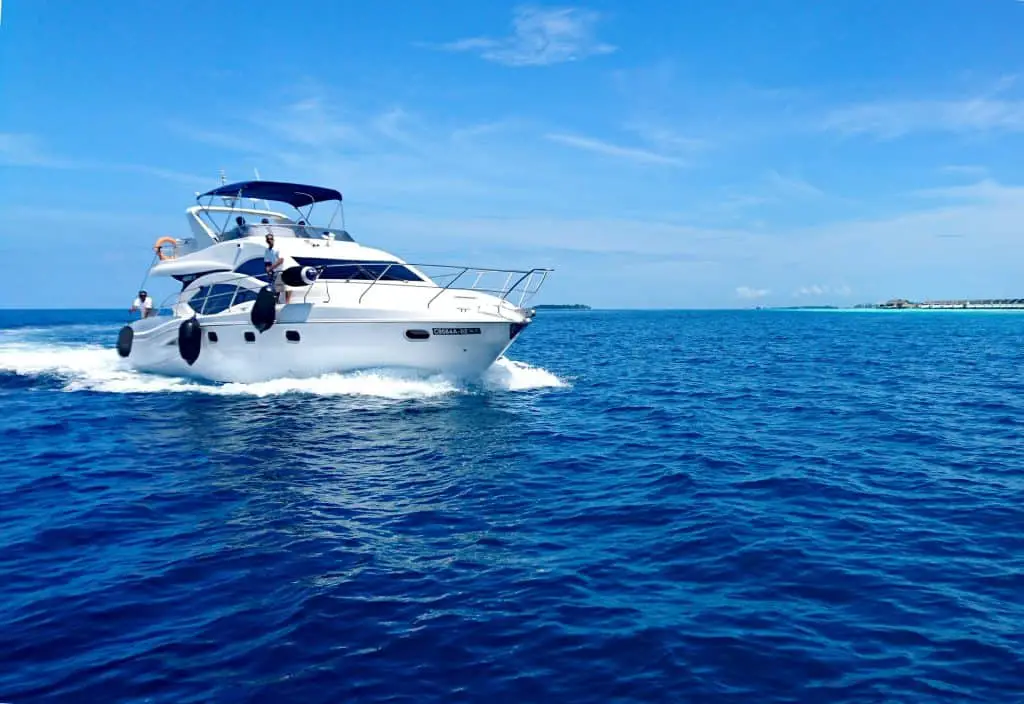
Can I Pilot My Own Yacht? Qualifications & Licenses
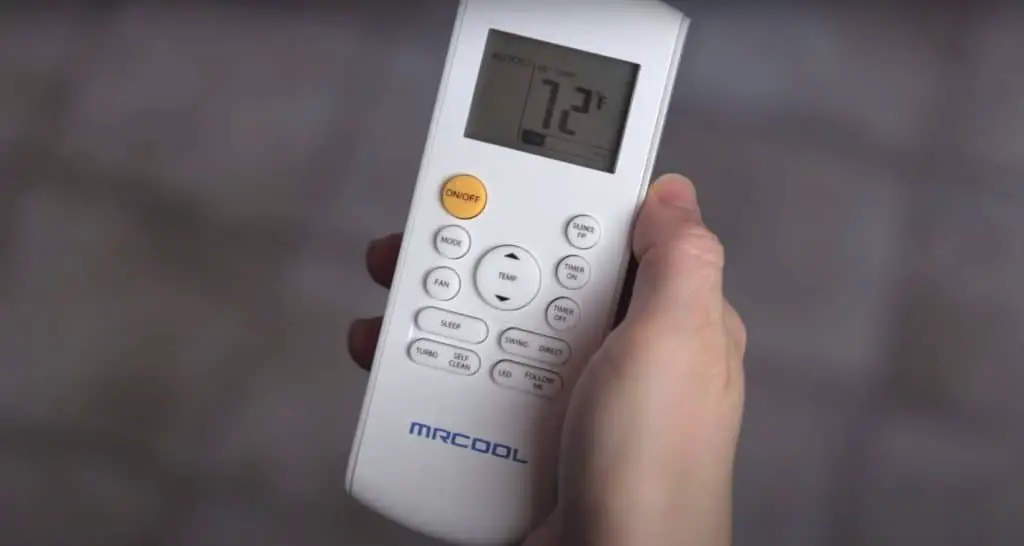
Do Yachts Have Air Conditioning? (Yacht AC Types)


Jordan Yacht Brokerage
We Never Underestimate Your Dreams
Yacht broker license florida.
Florida is one of only 2 states (California) whose yacht brokers are licensed and bonded. All brokers at Jordan Yachts must be and are proud to do so. We take pride in our fiduciary responsibilities. To become a Florida yacht broker, you must go through a somewhat tricky process. Before you start, you need to have a job offer from a licensed and bonded Florida yacht brokerage. All brokerages including Jordan Yachts are always looking for talented and experienced salesman. Come around to us, and we’d be happy to talk with you. Check with the Florida Yacht Brokers Association for licensed brokerages.
Now if you have a job offer, the first step is to order material from the Florida Department of Business and Professional Regulation: Division of Florida Condominiums, Timeshares, and Mobile Homes. Call them at 850 488 1122 and order the free packet of materials which include a law book, application, and fingerprint card. The packet will take a few days to come. You could also instead print the online application and just ask to order fingerprint cards.
While you are waiting for the packet or fingerprint card, the second step is to get bonded. You must apply to an insurance company which will cover you. A bond insures clients that if you fail your fiduciary responsibilities they will be reimbursed. You must qualify for a bond of $10,000 to become a yacht broker. If you have healthy credit, you should not have a problem. Sihle group is a common insurer. Their bond fee is $90. You must renew every 2 years. The insurance process is quick and can be done in a day via fax or email.
Third, you should now have the application and fingerprint card. Go to a police station and get fingerprinted. You will pay around $10 to the police. The fingerprinting simply means a police station volunteer will ink your fingertips and smudge your prints on the card. The volunteer will ink every finger but especially your thumb. They do this to verify your identity and put you in the police records. Take a drivers license or passport with you. A local place in Ft. Lauderdale is the Wilton Manors police station . Check with the police station for dates and times.
Fourth, with your bond and fingerprint card, now fill out the application. You answer questions about your criminal history. You must have a clean record to be licensed or convince the state you have reformed. You also need your employing broker of record to sign on and sponsor your application. The broker is your employer, and his/her signature shows you are respectable in the industry.
Finally, send your bond, fingerprint card, and application in with a check for around $550. You will get a 90 day temporary in a month and later your permanent license. To be a Florida yacht broker, you must pay a total of $650 dollars, have a clean record, be employed with a brokerage, and have healthy credit. Jordan Yachts wishes you good luck and hopes to work with you.
Leave a Reply
Your email address will not be published. Required fields are marked *
Save my name, email, and website in this browser for the next time I comment.
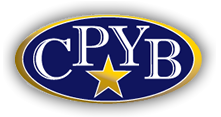
Certified Professional Yacht Brokers
Find your cpyb.
Yacht Sales Professionals (brokers, dealers, salespeople) have a benchmark for measuring their skills, abilities and performance, while, at the same time, enhancing their marketing value. Boat sellers and buyers are in a better position to select qualified, competent sales professionals with confidence and trust.
If you want to set yourself apart, the certified professional yacht broker (cpyb) program is for you..

Get Certified
CPYB Certification is the mark of excellence for yacht sales professionals throughout North America.
Earning Certification
CPYB brokers have met professional qualifications and have successfully passed a three-hour examination, testing their skills and knowledge as yacht sales professionals. If you are committed to professionalism and have what it takes, we invite you to apply.
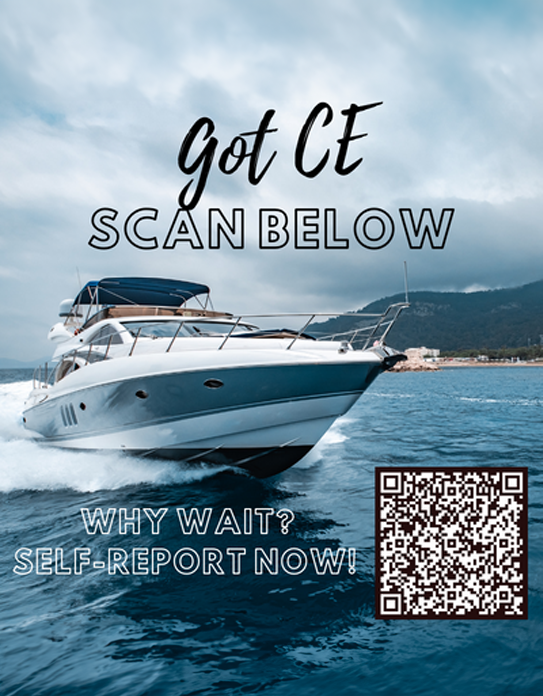
Renew Your Certification
Retaining certification ensures you stay current with industry trends.
As you know, staying competitive and successful requires a continuing commitment to educating yourself on the latest industry information and insights. That is why the basis of CPYB Recertification requires your participation in educational activities and professional involvement that help you to remain one of the most experienced brokers in the brokerage industry.
See How Companies Like Yours are Growing with CPYB
Upcoming pre-approved events, wed 17 2024, april 17, 2024 2:00pm - 3:00pm edt, cpyb webinar: hosted by cyba, webinar date: april 17, 2024, thu 16 2024, may 16, 2024 12:00pm - 2:00pm edt, brokers brunch: hosted by ybaa, webinar date: may 16, 2024, january 2024: recognition for new cpybs.
Join us in celebrating the new CPYBs certified in January 2024.
Staley Weidman, CPYB named Sailboat Broker of the Year 2023 by the IYBA
The Certified Professional Yacht Brokers would like to congratulate Catamaran Company CEO, Staley Weidman, on being named the Sailboat Broker of the Year 2023 by the International Yacht Brokers Association (IYBA).
Certified Professional Yacht Brokers Award Don Finkle and Pat Sturgeon with the 2023 Dedicated Service Award
WASHINGTON, DC − On November 15, 2023, the Certification Advisory Council of the Certified Professional Yacht Broker (CPYB) awarded the 2023 Dedicated Service Award to Pat Sturgeon —a CPYB and yacht broker for Pat Sturgeon Yachts in Mississauga, Ontario and Don Finkle—a CPYB and yacht broker for RCR Yachts in Youngstown, New York.
Certified Professional Yacht Brokers Award Brian Commette With Vincent J. Petrella Chairman's Award
WASHINGTON, DC − On November 15, 2023, the Certification Advisory Council of the Certified Professional Yacht Broker (CPYB) awarded the 2023 Vincent J. Petrella Chairman’s Award to Brian Commette —a CPYB and yacht broker for Northrop & Johnson in Newport Beach, California.
Industry Partners
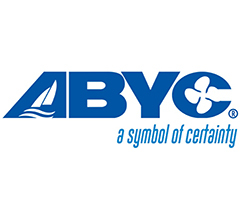
Partner Associations

CPYB :: National Press Building 529 14th Street NW, Suite 1280 Washington, DC 20045 USA Phone: 410.940.6349 Email: [email protected]
©2024 CPYB Certified Professional Yacht Brokers All images and content ©2024 CPYB All rights reserved | Legal Disclaimer


- Support Home
- /app/account/overview, Support History > /app/account/questions/list, Account Settings > /app/account/profile, Notifications > /app/account/notif/list"/>
How do I renew my Florida yacht broker or salesperson license?
You may complete the renewal application online at https://www.myfloridalicense.com/intercept.asp or mail in your renewal application to: Department of Business and Professional Regulation Attn: FCTMH's Yacht and Ship Brokers' Section 2601 Blair Stone Road Tallahassee, Florida 32399-1030 At least 60 days prior to your license expiration date, the Division of Florida Condominiums, Timeshares, and Mobile Homes will mail to you a DBPR Form YS 6000-6 (Application for Yacht and Ship License Renewal/Branch Office Renewal). Your application for license renewal must include the $500 renewal fee and the surety bond or letter of credit, or proper continuation certificate.
References:
- Rule 61B-60.003, Florida Administrative Code
For more details:
- For publications, forms and other educational material, visit the Division of Florida Condominiums, Timeshares, and Mobile Homes' web page at http://www.myfloridalicense.com/DBPR/condominiums-and-cooperatives/ctmh-forms-and-publications/
Answers others found helpful
- How do I obtain a license to become a yacht and ship broker or salesperson in Florida?
- What is the difference between a Florida licensed yacht and ship broker and a Florida licensed yacht salesperson?
- How do I find out if a yacht broker or salesperson is licensed by the state of Florida?
- How long does it take the Division of Condominiums, Timeshares, and Mobile Homes - Yacht and Ship Brokers’ Section to process an application for a license to act as a yacht and ship broker or salesperson?
- When is a yacht and ship broker’s or salesperson’s license not required for a yacht transaction in Florida?
Find Answers
Common Surety Bonds:
- Freight Broker Bond (BMC-84)
- Contractor's License Bond
- Motor Vehicle Dealer License Bond
- Certificate of Title Bond (for vehicle titles)
- Insurance Adjuster Bond
Other Options for You:
- Surety Bonds by State
- Click to Call and Speak with a Surety Bond Expert Call and Speak with a Surety Bond Expert 1-800-608-9950
9 Things to Consider When Buying or Selling a Yacht in Florida
From choosing a broker with a Florida yacht broker license to conducting your sea trial, these key tips will help you buy or sell your yacht in Florida.
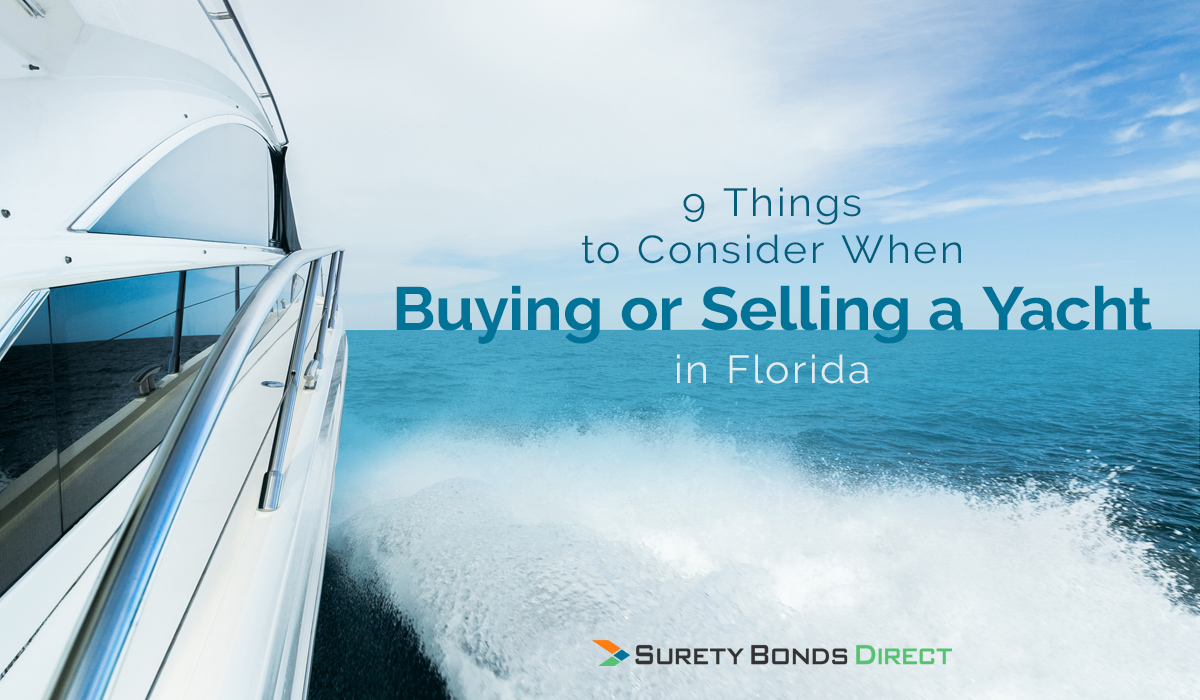
For Floridians who feel the call of the ocean, a yacht can be a treasured investment. It can be the gateway to adventure, leisure, and the ability to explore the beautiful coastlines of the Sunshine State. On a yacht, you can relax with friends, go for a swim, enjoy a delicious meal, or even catch that meal fresh from the ocean.
However, a yacht is a major investment, and buying or selling one involves assuming certain responsibilities. From finding a broker with a Florida yacht broker license to paying all required taxes and fees, it’s important to be aware of the critical process steps before beginning your yacht buying or selling journey.
Anyone buying or selling a yacht in Florida should know about the nine key factors that we’ll discuss here. We’ll discuss four factors of buying a yacht in Florida, four for selling a yacht in Florida, and one best practice that yacht buyers and sellers alike should follow.

Buying or Selling: Use a Broker with a Florida Yacht Broker License
Both yacht buyers and yacht sellers will benefit from using a licensed and certified Florida yacht broker. Buyers will love the security and confidence that comes with working with an experienced yacht expert. Sellers will get a competitive advantage by working with someone who knows how to highlight a yacht’s best qualities and reach out to qualified buyers.
You can check a Florida yacht broker’s license by searching for the broker or salesperson’s name or license number in the Florida DBPR ’s records. If the yacht broker employs other yacht salespeople, the sales staff should hold Florida yacht salesperson licenses . Avoid working with a yacht broker or salesperson who has had their license suspended or makes excuses for their lack of licensure.
It’s also highly recommended to work with a yacht broker with a certification from the Yacht Brokers Association of America (YBAA). Their Certified Professional Yacht Broker (CPYB) certification is the industry’s gold standard for yacht sales professionals. A yacht broker must fulfill several qualifications to achieve CPYB certification, including passing a written exam and demonstrating at least two years of experience in the industry.
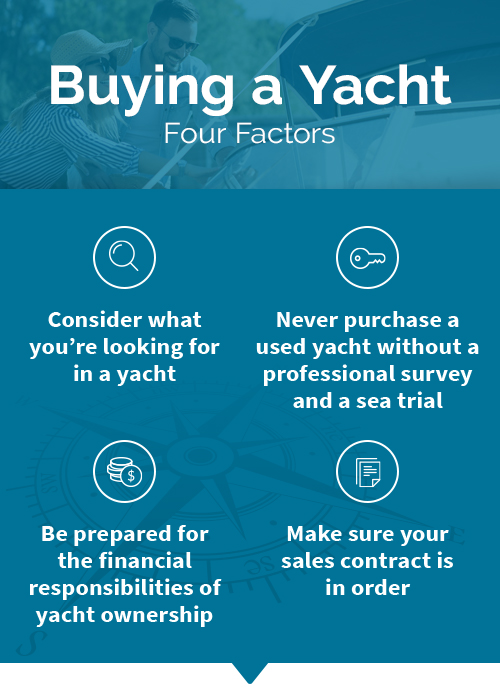
Buying a Yacht
Know approximately what you’re looking for. .
Before beginning your yacht-buying journey, you’ll want to consider what you’re looking for in a yacht. Consider the major factors that will influence your selection, including:
- What is your budget?
- Are you interested in buying a used or new yacht?
- Are you interested in motor yachts, sail yachts, or both?
- How many passengers does your yacht need to hold?
- Do you want a yacht that you can pilot yourself or one that needs a crew?
- Do you want a yacht equipped with full-sized bedrooms and indoor living areas?
- What kind of activities (e.g., fishing, swimming, scuba diving) are you interested in enjoying on your yacht?
- Do you want your yacht to include features such as a swim platform or dinghy?
- What kind of media-playing devices do you want your yacht to come equipped with?
- Do your local marinas have slip size limitations that will restrict the size of yacht you can choose?
While you’re considering these key factors for choosing your new yacht, start reading reviews of popular yacht models. Learn about the must-have features of today’s yachts and explore the listings of local yacht dealers. This “pre-selection” process is crucial for narrowing down the many models of yacht available and directing your attention toward the models that most suit your wants and needs.
Never purchase a used yacht without a professional survey and a sea trial.
Before purchasing a yacht, you should have the utmost confidence that the vessel is seaworthy and that you enjoy spending time on it. The best way to achieve this is through a professional survey and sea trial.
A professional yacht surveyor has the tools and expertise to give a yacht a true assessment of seaworthiness. You can find a qualified professional marine surveyor through organizations like the American Boat and Yacht Council , or your Florida yacht broker can recommend one. Many lenders require a yacht to be professionally surveyed before they will agree to finance its purchase.

You’ll also want to take the yacht out for a sea trial (essentially a test drive). During a sea trial, you’ll want to take note of key factors such as:
- Engine performance, both at top RPM and cruising RPM
- Amount of vibration and noise created
- Ability to handle tight turns
- Functionality and design of marine electronics
- Suitability for your favorite activities
- Comfort for both driver and passengers
- Sun glare and reflections that make instruments hard to read
If you’re not a boating expert, bring an experienced friend (or even your surveyor) along during the sea trial. Remember that the buyer assumes the fuel cost of the sea trial, so reserve it for a yacht that you’re serious about buying.
Professional surveys and sea trials do increase the cost of buying a yacht. However, these costs pale in comparison to losses or repair costs you may incur from buying a mechanically unsound vessel, so resist the temptation to save money by skipping these important steps.
Make sure your sales contract is in order.
A sales contract is an essential legal document for a yacht purchase. Sales contracts should include all of the following information:
- Full names and contact information of the buyer and seller
- The make, model, engine serial number, year of manufacture, and hull identification number (HIN) of the yacht
- Purchase price of the yacht and payment method, including escrow account information
- Seller’s declaration that no outstanding liens or taxes are owed against the yacht
- A detailed assessment of the yacht’s mechanical and cosmetic condition, including disclosures of any known issues
- Detailed description of any warranty included with the yacht’s purchase
- Date on which the seller will deliver the yacht and finalize the sale
- Clauses that make the sale of the yacht contingent on a satisfactory sea trial and inspection

Buyers and sellers alike should have their sales contract inspected by an attorney with experience in maritime and/or contract law. In the event that any questions or disputes arise later, this contract will ensure that you can obtain legal recourse.
Be prepared for the financial responsibilities of yacht ownership.
Owning a yacht is a major financial commitment that doesn’t end when you’ve signed the purchase papers. Yacht ownership involves numerous financial responsibilities such as:
- Slip and mooring fees
- Yacht club or marina membership
- Maintenance and repair costs
Before making your purchase, do some research about how much you can expect to pay for these upkeep costs. Contact your local marinas to learn the cost of their available slips, and talk to an insurance company about their insurance products for marine vessels. Finally, don’t forget that you’ll also need to pay a 6 percent Florida sales tax on the yacht’s value.
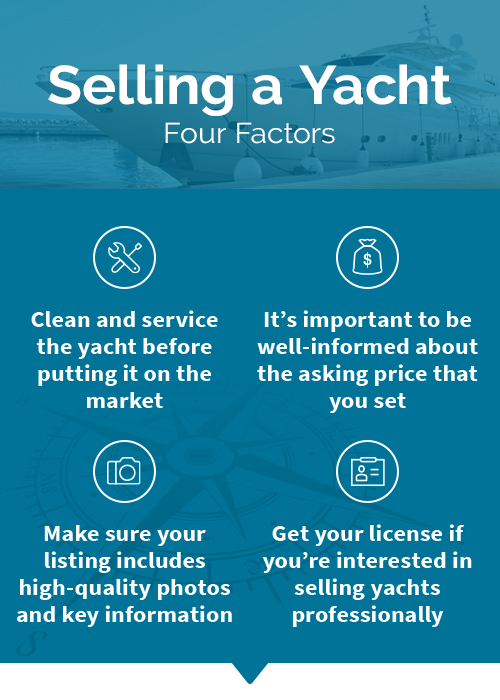
Selling a Yacht
Clean and service the yacht before putting it on the market..
The interior, exterior, and mechanical condition of your boat should all be in the best possible state before you list your vessel. Some steps that sellers can take to make a yacht appealing to a buyer include:
- Cleaning the interior thoroughly, including the bilge and engine room
- Removing excessive personal effects and clutter to make the interior seem more spacious
- Waxing the boat, repairing the gel coat if necessary, and cleaning the hull
- Ensuring that caulking and sealants are in good condition
- Replacing dock lines
It’s often worth the cost to hire a professional boat detailer to get the interior and exterior of the yacht looking great. Owners of smaller yachts can save money by detailing their own boats, although it’s important to do your research on the proper cleaning techniques for your yacht model.
A marine mechanic should give the yacht a thorough inspection before you place it on the market. Even if your boat runs smoothly, it may have hidden mechanical issues that only a trained professional will notice. Make sure to have any repairs completed by a professional prior to sale, and get them documented in writing by your mechanic.
Do some market research.
Unfortunately, it’s not as easy to find an accurate value for a yacht as it is for a car or truck. Thus, it’s important to be well-informed about the asking price that you set for your vessel. There will be a variety of factors that affect the value of a yacht in Florida, including:
- Size of the yacht
- Make, model, and manufacturing year of the yacht
- How well the yacht has been maintained
- Geographic area of Florida in which the yacht is being sold
- Time of year that the yacht is being sold
- Amount of time the yacht has spent on the market

Sellers can look at yachts of similar models and sizes on yacht listing sites to get an idea of the potential value of their yacht, but the best option is usually to work with a qualified Florida yacht broker. Brokers have access to years of yacht sales data that helps them find a realistic asking price for your vessel, and they know how to evaluate a vessel’s condition in ways that a layperson usually doesn’t.
Make sure your listing includes high-quality photos and key information.
For most buyers, a yacht’s online listing will be their first and only impression before seeing the vessel in person. You’ll want to spend some time crafting a listing that entices buyers and provides all of the relevant information, preferably with the help of a licensed Florida yacht broker.
It’s a great idea to hire a professional photographer to take HD pictures of your yacht’s interior and exterior. Clean, well-lit photography will help you emphasize the vessel’s most attractive features. Try to keep other boats and marina features out of the shots as much as possible.
Your listing should also include a complete summary of the boat’s most important information, including its make, model, year, and engine specifications. Make sure to have this information on hand, as well as the title and registration, before you reach out to a Florida yacht broker to list your yacht.
Get your Florida yacht broker or yacht salesperson license if you’re interested in selling yachts professionally.
If you’re interested in entering the yacht business as a Florida yacht sales professional, it’s important to have the right credentials. You’ll need a yacht broker license or yacht salesperson license issued by the state of Florida, which you can apply for using state form BPR 6000-2 .
To get a Florida yacht broker license , a broker must register with the Florida Department of Business and Professional Regulation and provide a $25,000 yacht broker surety bond . A yacht salesperson licensure (which requires the salesperson to work for a licensed yacht broker) requires a $10,000 yacht salesperson surety bond . These requirements help ensure that licensed Florida yacht brokers are financially sound and that the customer’s financial interests are protected in the event of a dispute.
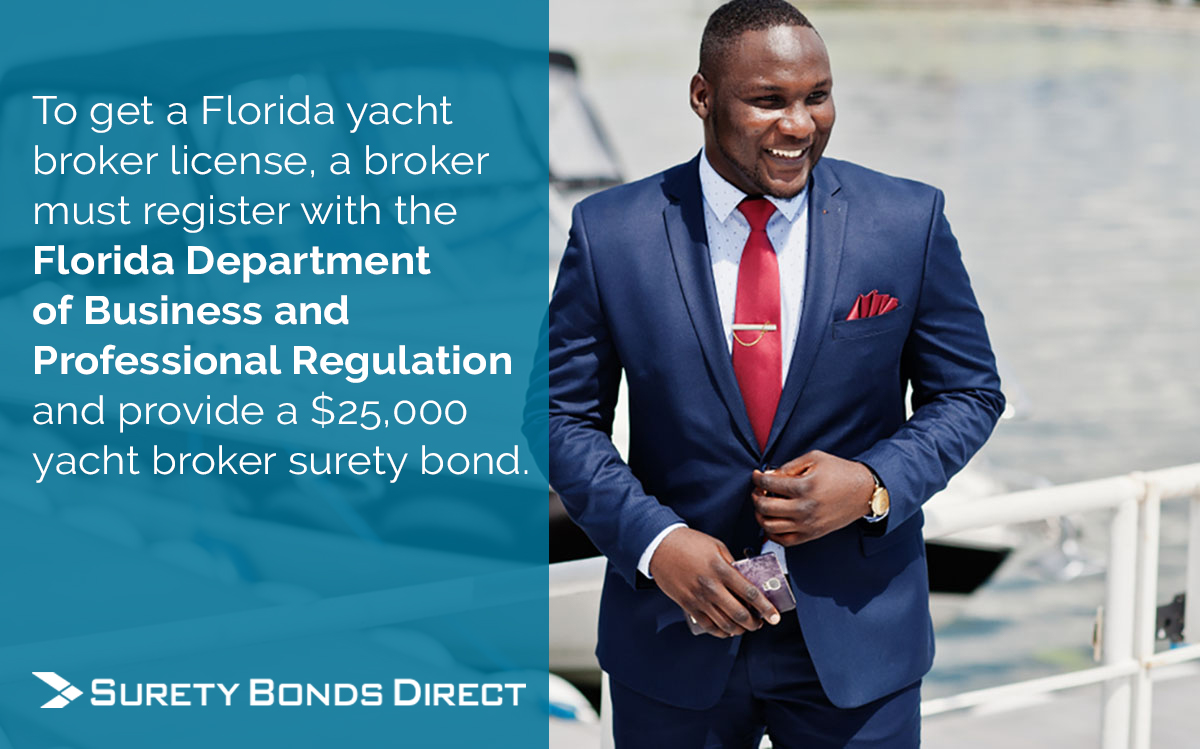
Note that yacht brokers must have at least two years of licensure as a Florida yacht salesperson working for a licensed broker. If you’re entering the yacht sales field for the first time professionally, you should begin your career as a licensed Florida yacht salesperson.
Buying or selling a yacht is a big decision that shouldn’t be taken lightly or made too quickly. Take your time to do the relevant research, and work with a trusted professional Florida yacht broker to help you get the deal that’s right for you.
For those on the path to their Florida yacht broker license, Surety Bonds Direct offers the easiest and most cost-effective way to get a surety bond in Florida . Call us at 1-800-608-9950 to speak to a surety bond expert, or get your yacht broker surety bond quote online today for free in just a few minutes.

Get a Free Quote For Your Bond »
Or Call a Bond Specialist 1-800-608-9950
It's Fast, Free & No-Obligation

VIDEO
COMMENTS
To apply for a yacht and ship broker or salesperson license, you must complete an application on DBPR FORM YS 6000-1, and submit it along with the $551 fee, a complete set of fingerprints, and an original surety bond or letter of credit in the amount of $10,000 for a salesperson or $25,000 for a broker.. References: Rules 61B-60.003, Florida Administrative Code
Using the links below, you can get information on licensing requirements, check the status of an existing application, apply using a printable application, or access the online application system if available for the specific business or profession. ... Yacht & Ship Employing Broker, Broker or Salesperson's initial License: Yacht & Ship ...
The yacht salesperson license allows you to work for a yacht brokerage and sell yachts under the supervision of a licensed yacht broker. To obtain a yacht broker or salesperson license in Florida, you must meet the following requirements: Be at least 18 years old. Be a high school graduate or have a GED.
In order to obtain a yacht broker license in Florida, applicants must first pass the FREC yacht broker exam. This exam covers a variety of topics related to the sale and purchase of boats, such as boat types, financing, and sales techniques. The exam consists of 80 multiple-choice questions, and applicants must obtain a score of 75% or higher ...
For example: You'll need to provide fingerprints, a completed application, and a surety bond. However, the surety bond amounts aren't the same. The Florida Yacht Salesmen License requires a $10,000 bond while the Yacht Broker License requires a $25,000 bond. You can find the price of your bond by applying here.
The yacht brokerage process typically begins when a boat seller lists the yacht with a broker. Generally, the seller will agree to pay a commission to the yacht broker when the vessel sells (usually 10 percent of the boat's purchase price). This commission will be paid to the selling broker at the closing.
This comprehensive video guide outlines the yacht and ship salesperson/broker license application process set forth by the Florida Department of Business and...
Step 1: Complete your Florida yacht and ship salesperson or broker license application. You can apply for your yacht and ship broker or salesperson's initial license online through the DBPR Online Services or fill out the physical application DBPR Form YS 6000-1. If you have questions while completing your application, you can contact the ...
Applicants for yacht and ship licenses in Florida must meet specific criteria. First, individuals must be at least 18 years old and of good moral character. Second, they must complete a pre-licensure course approved by the DBPR. Third, applicants must pass a written examination administered by the DBPR. Fourth, they must submit a surety bond or ...
Welcome to the Department of Business and Professional Regulation's Application Center. Using the links below, you can get information on licensing requirements, check the status of an existing application, apply using a printable application, or access the online application system if available for the specific business or profession.
Published 10/19/2010 11:42 AM | Updated 12/13/2018 03:00 PM. How do I find out if a yacht broker or salesperson is licensed by the state of Florida? You may verify a yacht broker's or salesperson's license by visiting www.MyFloridaLicense.com, or by contacting the Yacht and Ship Brokers' Section at 850.487.2987.
A Florida licensed yacht salesperson is a person who has been licensed by the Division, and who is employed by a broker to perform any acts of a broker. Each salesperson's license must remain in the possession of the employing broker until canceled or until the salesperson leaves such employment.
Proof of present employment as a yacht broker for at least 1 year. Proof of employment as a yacht broker for at least three years in the past 10 year period. Proof of ethical yacht sales and necessary documentation. A dedicated escrow/trust account for all client funds in trust. Where applicable, the individual holds all necessary licenses ...
The 2023 Florida Statutes (including Special Session C) 326.004 Licensing.—. (1) A person may not act as a broker or salesperson unless licensed under the Yacht and Ship Brokers' Act. The division shall adopt rules establishing a procedure for the biennial renewal of licenses. (2) A broker may not engage in business as a broker under a ...
The broker is your employer, and his/her signature shows you are respectable in the industry. Finally, send your bond, fingerprint card, and application in with a check for around $550. You will get a 90 day temporary in a month and later your permanent license. To be a Florida yacht broker, you must pay a total of $650 dollars, have a clean ...
The course is not required at the time of application submission. You may submit application for state exam approval prior to taking the pre-license education. See the list of approved providers. EDUCATION EXEMPTIONS: If you hold a 4 year degree, or higher, in real estate you may be exempt from the pre-license education requirement.
WASHINGTON, DC − On November 15, 2023, the Certification Advisory Council of the Certified Professional Yacht Broker (CPYB) awarded the 2023 Vincent J. Petrella Chairman's Award to Brian Commette —a CPYB and yacht broker for Northrop & Johnson in Newport Beach, California. view all news.
How to become a yacht broker. 1. Take college or university classes. Although some brokerages may not require a bachelor's degree in sales or a related field, consider taking postsecondary courses in sales and marketing to prepare you for this role. Even if it's not required by employers, obtaining a bachelor's degree can benefit you if you're ...
Eligibility Requirements. If you have been a yacht broker for two-years and work or are affiliated with a Brokerage House that follows strict ethical business practices, you are candidate eligible. Becoming a CPYB signals to your buyers and those in the profession that you have broad-based competencies and skills that puts you in an elite group.
Attn: FCTMH's Yacht and Ship Brokers' Section. 2601 Blair Stone Road. Tallahassee, Florida 32399-1030. At least 60 days prior to your license expiration date, the Division of Florida Condominiums, Timeshares, and Mobile Homes will mail to you a DBPR Form YS 6000-6 (Application for Yacht and Ship License Renewal/Branch Office Renewal).
You'll need a yacht broker license or yacht salesperson license issued by the state of Florida, which you can apply for using state form BPR 6000-2. To get a Florida yacht broker license, a broker must register with the Florida Department of Business and Professional Regulation and provide a $25,000 yacht broker surety bond.
If you are looking for a license or a license verification in Florida, you can use the Licensing Portal - License Search feature on MyFloridaLicense.com. You can search by name, license number, city, county, or profession. You can also access the online services of the Department of Business & Professional Regulation through this portal.
licensure period. Any changes made after issuance of the original license shall be filed with DBPR (Yacht & Ship Broker's Program), along with the required $100 change fee. Upon receipt of the change notification and fee by DBPR, a new license will be issued and mailed to the licensee. NOTE: Changes include licensee or company
The state requires these bonds be issued with a $10,000 bond amount for 2 years, so the $175 premium includes both years for salesperson bonds. Florida yacht and ship broker bond amounts are set at $25,000 and require a quick underwriting review to determine pricing. Premiums for the state-required 2-year term start at $225 for broker bonds.